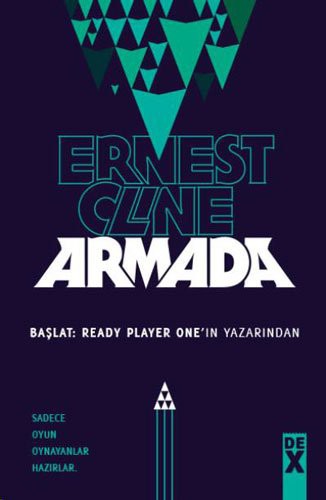OK, first my disclaimers. I am not in the intended audience for this book. I'm the wrong age, for one. (Too old.) My values don't match (aesthetically and morally). Possibly as a consequence of the previous mismatches, but not completely because of them, I don't worship pop-culture icons or philosophies, works of "art", etc. And, worst of all, I'm not a gamer.
There! I got that out of the way. One more thing--I don't believe in books with intended audiences. I'm not a fanatic on this point, but I like to think it's better to be writing for an audience of all humans, rather than, say, humans who agree with me. I understand that this is nearly an impossible standard and that culture exists and divides us despite our best intentions, but I would hope we wouldn't surrender to this limitation so quickly.
Now my confessions. I understand competition. I've played some games. Enough to not have to have PVP explained to me, or NPCs, or artifacts, even. I've played text adventure games, including Zork. I got the Cap'n Crunch clue the first time I heard the quatrain (I'd explored phreakery for a short time) I even appreciated the double initial conventions of comic book superheros, with W.W. and H.H. echoing Lois Lane, Peter Parker, etc. I've seen (and liked) Blade Runner, War Games, Monty Python, Brazil (I got the Harry Tuttle reference), Firefly. I do hate large corporations, appreciate the difficult social life of the geek, like solving puzzles and appreciate the steps and missteps involved, resent cheaters in on-line games.
Last night, I watched the movie Not Fade Away which was in large part and infodump of my generation's touch points--Jagger meets Richards, The Beatles on Ed Sullivan, JFK and Martin Luther King, etc. It reminded me how miserable I was as a kid. The nostalgia didn't help. I wasn't prompted to remember the good parts and minimize the bad--almost enjoy the bad because we suffered through them together and watched our values prevail. The idea that one would look back to the 80s as the good old days is insane to me. There never were any good old days. The riches won as the prize would do precious little to fix the ills of 2044 and might inadvertently make it worse. Halliday asks Parzival to use his powers for good (as if the IOI villains experienced themselves as using their powers for bad) but "good" is a naive value. For me, it would not include making money by using your fame to endorse a product, for example. Remember Google's "Don't be evil?" How are they doing?
OK, so forget the realism arguments. This book adheres more to the conventions of comics or video games where the good are all good, the bad are all bad. Love can conquer all. Winners can fix what needs to be fixed. If we can accept this in some media, why reject it in others?
Well, there are some reasons. Novels are long. We expect this length to be matched by character depth. Nolan Sorento coded some good games, Wade admits, but, what happened to him? Where's his character depth? We know (if we are into comic book trivia) why Lex Luthor turned evil. Did Nolan just sell out for the power and money? I didn't find it convincing. A detail I especially liked is that the evil corporation had to hire programmers (because money lacks skills and must purchase them) and these coders then inserted their own trap doors in the code. However, this doesn't happen much in practice because IRL, non-trivial commercial code is reviewed by several others who can't all be in on the conspiracy. This is especially true in a corporate environment--and doubly so in an evil paranoid one. Yet I still enjoyed the concept of the contemptuous misused employees striking a blow against their employers.
That Wade could pull off a perfect game of Pacman is easier to accept than that he can hack a corporate network and write bug-free code in a matter of a few days with no opportunity to test anything. That a few geniuses can outwit a megacorporation so easily (and that their only skill is cheating, threatening, bribing and enslaving) doesn't work as well in a novel than in a comic book. That kids with little real relationship experience, who hated their physical selves until the end can succeed in a relationship, is OK with me. I'll suspend my disbelief because it feels good.
The foreshadowing was mostly transparent. Wade had to used the beta capsule and the magic quarter and I waited for it. Similarly, IOI would have to use the artifacts it was known to have. And Shoto goes for revenge. Still, the extra life trick was a good one.
A port wine birthmark is a pro-forma disfigurement. We can feel good about this triumph against looksism without there having been a serious challenge.
For all that others complained about the writing, I found it a better read than Corey Doctorow (now on the OASIS board), much of Douglass Adams, and other canonically admired writers. (Vonnegut is in a whole 'nother class, though.) That reality is better than the OASIS (if that's the moral of the story) is questionable. Groucho to the contrary, you can get a lot of bad meals in the real world too, and often in 2044, no meals at all. Reality is something we face, because we have to. Not something we learn is better aesthetically. Hey--we're readers here. We prefer a book, even (or especially) one that's unrealistic, to boring, annoying, terrifying reality. What's more it's not all that real either. Yeah, realer than facebook, but the impulse behind facebook strongly infects the real world wherever you turn in how we present ourselves (even to ourselves) and converse and think about things and everything else. If you don't believe me, drop some acid some time and look around you. Or just read R. D. Laing. Or Erving Goffman, Ernest Becker. (Even Ernest Cline has W.W. say that meeting someone mind to mind on line is more intimate than vaunted real life.
Should we really value genius and hard work the way we do in this book? We have to value something. We question the values of society that rewards rapaciousness, manipulation of others, and deceit. We reject the values of religion, but the most unambiguous good person in the book is the innocent, murdered, Mrs. Gilmore. I'm just going to ask how we who claim to be realists choose our values.
Personally, if I were going to hack the IOI database, while I was in there, I'd free all the indents--maybe with a timer-executed program. What chaos that could cause!
SNL is still on the air in 2044? I hope it got good again at some point. No, really, that it was all these years in the future and (outside the important theme elements of the book) society has changed so little was too unbelievable to overlook. Wade jokes about Art3mis being a 40-ish balding guy named Chuck, but what's wrong with that? It's an age-ist and sexist and looksist kind of a joke underneath it all, which we then overcompensate for in the person of Aech (who gets to be the only Black person in the book.) If we, the reader, were sure that Aech was white and male, it is our assumptions, not Wades, that get subverted. And speaking of racism, the Japanese "brothers" are given a cliche stereotype character that is already pretty outdated in 2013. By 2044, it can't have reverted that much. We still have countries in 2044, but they all suck so much that we don't care about world politics at this point? (Wade doesn't bother to vote, except for OASIS council--it was fun to hear Wil Wheaton read his own name in the audiobook as if it was just another line of text.)
Which leads one to ask, why 2044? 2022 would have been more convincing, considering how little has changed but at only 9 years into the future, I can see why one might want to hold off on our destruction.
I complained a lot up there, and yes, I wish it had been better at many points, but in the end, I enjoyed it, the way one enjoys a piece of pop-culture, perhaps, without over-analyzing or insisting it meet the standards of the stuff we were told in school is real art. I teared up at the sentimental parts as I was supposed to, even though the happy-ish ending was never really in doubt.





